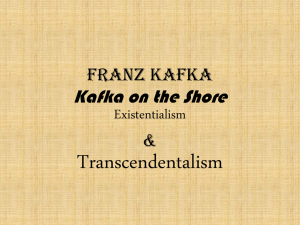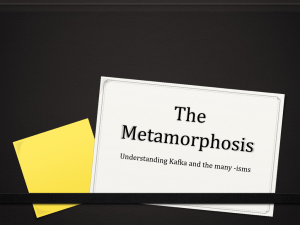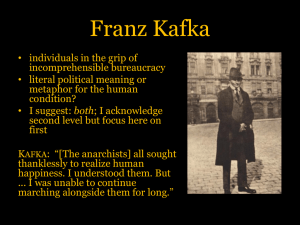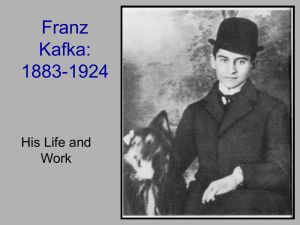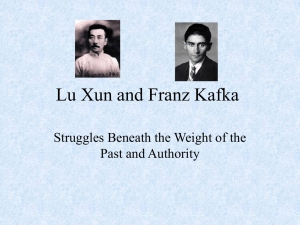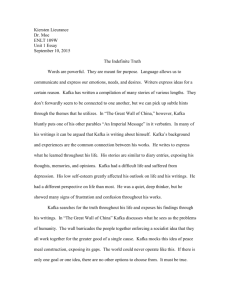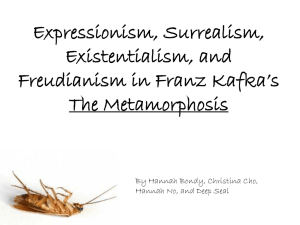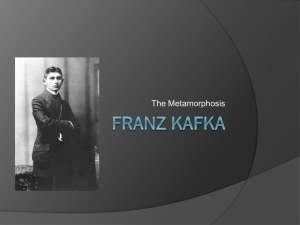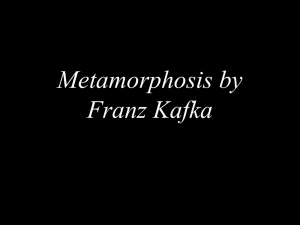Franz Kafka
advertisement
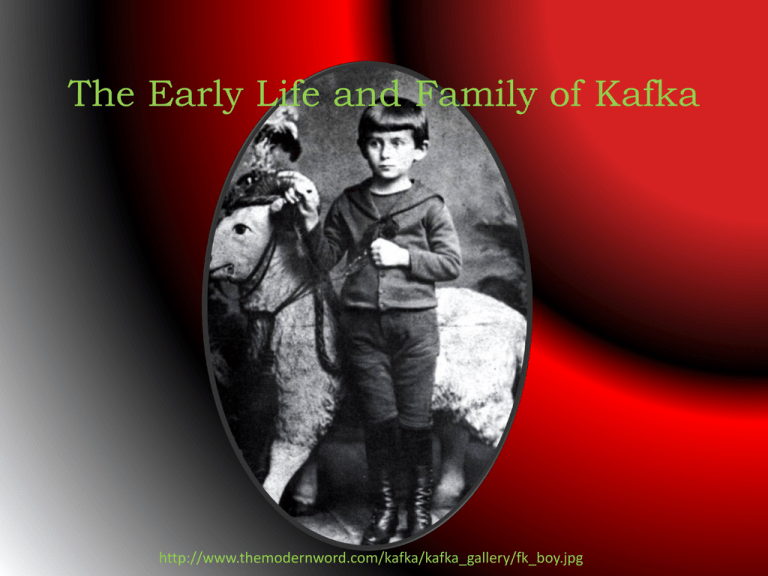
The Early Life and Family of Kafka http://www.themodernword.com/kafka/kafka_gallery/fk_boy.jpg Birth • Birth Date: 3 July 1883 • Birthplace: Prague, Austria-Hungary • Parents: Hermann Kafka and Julie Kafka (Löwy) • Nationality: Bohemian (Austria-Hungary) • Religion: Jewish • • • http://www.porges.net/KafkaFamilyTree.html http://en.wikipedia.org/wiki/Franz_Kafka http://www.slovak-republic.org/pictures/historical-maps/austria-hungary-map-1914.png Family • Franz Kafka was the eldest of six children • Two brothers: Georg and Hienrich • Three sisters: Gabriele, Valerie and, Ottilie • • http://www.porges.net/KafkaFamilyTree.html http://www.zwoje-scrolls.com/zwoje43/kafka_i_siostry.jpg Early Life • Franz was born to a family of the middle to uppermiddle class. • Franz’s brothers died at an early age, at less than a year a piece. • Franz and his sisters were mostly raised by governesses, as was the common practice. • The family moved a lot as their financial status increased. • Franz, though withdrawn and quiet, was on good terms with his sisters and often wrote them plays in his spare time. • He learned Czech from one of his governesses, he attended a German school, and did quite well. • http://www.kafka-franz.com/kafka-Biography.htm Franz Kafka Fluent in German and Czech Deutsche Knabenschule school Jewish education was the Bar Mitzvah Charles- Ferdinand University Didn’t like going to a synagogue Took law and became a lawyer in 1906 Met Max Brod at school Works Novels Amerika Novellas The Metamorphosis Short Stories Jackals and Arabs Nonfiction Franz Kafka: The Diaries 1910-1923 The Refusal A Hunger Artist The Trial The Castle In the Penal Colony Investigations of a Dog The Blue Octavo Notebooks The Letters Franz Kafka 1 November 1907, he was hired at Assicurazioni Generali. 15 July 1908, he resigned and was hired by the Workers Accident Insurance Institute of the kingdom of Bohemia Kafka and his friends worked on literary works during the 1880’s-end of WWI In 1911 he joined with Karl Hermann to establish the factory Prager Asbestwerke Herman and Co. Franz Kafka Kafka was a Vegetarian Became friends with Max Brod in 1901 Studied law at University of Prague. He received his doctorate in 1906 His first job was at the Assicurizioni Generali Insurance Company in 1907 1908, he began working at the Workers' Accident Insurance Institute. Started a notebook in 1910, but had to stop writing because of the war (he was a short story writer/novelist at the time) He was engaged to Felice Bauer who lived in Berlin. They met in Max Brod's home on August 13, 1912. They were engaged twice and called it quits in 1917. He Dedicated “Metamorphosis” and “The Judgement” to Felice Only a few of his stories were written in his life time. In 1914 he started “The Trial” (his second novel) In August of 1917 he began to suffer from tuberculosis. He had a dry sense of humor that was supported greatly by his sister, Ottla. In 1920 he began an intense relation ship with a Czech journalist and writer- Milena Jesenska In July 1923 met Dora Diamant, a 25 year old kindergarten teacher Little women, the burrow, and josphen the singer were written for Dora Later that year he returned to Prague then went to Dr. Hoffmann's in hierling for treatment He died June 3, 1924 (same year as Lenin) from starvation because of his throat so he couldn’t swallow and eating was painful Dora was with him when he died He was brought back to Prague and was buried June 11 1924 in the New Jewish Cemetery Dora changed her name to Kafka even though they didn’t marry (just like in the titanic) as tragic as the death of Kafka may have been, he died before he witnessed the suffering of most of his female friends and family. All of his sisters perished in the Nazi death camps after the breakout of world war two. July 3, 1883-June 3, 1924 Born to Jewish parents in Prague, Kafka grew up experiencing the old Anti-Semitism that had pervaded Europe for centuries. As a populist, he was regarded with suspicion by the authorities in the monarchical and conservative political system of Austria-Hungary. As a citizen of a Central Power in WW1, Kafka’s feelings of isolation would only increase when Austria-Hungary was defeated by the Entente, and was then broken into pieces. The ensuing anger towards Jews would only increase after the war, a further blow to Kafka’s mentality. http://www.bookedandloaded.blogspot. com/ www.kafka-franz.com/kafkabiography.htm http://www.holocaustresearchproject.org /holoprelude/ http://www.tcnj.edu/~guhr2/index.htm http://www.mapsorama.com/tag/demog raphic-map/page/2/ • absurdity, alienation, anxiety, cruelty, dark humour, doubt, fasting/starvation, formality, futility, guilt, insignificance, labyrinths, dominance vs. submission, meaninglessness, nature vs. technology, inability to meet goals or destinations, escaping or attempting to escape societal and mental limitations, transformation. Expansion on some of those themes: • Alienation: often from man, in the Metamorphosis it is expanded into dehumanizing jobs Formality: in style of writing and in the behaviour of characters Guilt: often without a specific or logical source Labyrinths: creates a sense of disorientation and complexity Transformation: can be in a physical or mental sense • Long sentence structure (sometimes a whole page) • Ambiguous terms, used on purpose • Kafkaesque: narrative made combining a realistic style with the distortions and absurdities of nightmare scenario • Some consider him existentialist, some modernist • A mix of realistic and detailed description with bizarre surreal events • More concise and lucid in his later years • Many believe that you need to look at him as an autobiographical artist because many of his short stories were never supposed to be viewed by the public • Kafka wrote in German so much of his long sentence structure and ambiguous terms are missed in English • It is up to the translator to keep the style of Kafka alive even in translation • www.novelguide.com/themetamorphosis/the meanalysis.html • www.wordiq.com/definition/Franz_Kafka • www.kafka-franz.com/franz-kafka-writing.htm • www.online-literature.com/franz-kafka • Franz Kafka - Richard H. Lawsom “Kafkaesque” The Term Kafkaesque can is sometimes defined as: -marked by a senseless, disorienting, often menacing complexity -marked by surreal distortion and often a sense of impending danger -an existentialist state of ever-elusive freedom while existing under immitigable control -an intentional distortion of reality by powerful but anonymous bureaucrats -reminiscent of the nightmarish dehumanized world portrayed in the novels of Franz Kafka, the Czech “Kafkaesque” • Works that are thought of as “Kafkaesque” usually contain themes of alienation from and persecution by an incomprehensibly complex, bizarre, and illogical and invincible world or system. • Works by Franz Kafka and those similar are described as having a: “..nightmarish style of narration, in which characters lack a clear course of action, the ability to see beyond immediate events, and the possibility of escape.” “Kafkaesque” • The lives and worlds of Kafka’s characters are dismal, yet because of their inherent absurdity and futility they appear almost comical • “Kafka presents a world that is at once real and dreamlike and in which individuals burdened with guilt, isolation, and anxiety, make a futile search for personal salvation." “Kafkaesque” Other Characteristics of Kafkaesque Writings • Morbid, subtle and contradictory humor • Isolation, solitude, insensitivity and cruelty • Exaggerated the bleakness • Satirical wit “Kafkaesque” Examples of “Kafkaesque” • FEMA arbitrarily denied thousands of vulnerable displaced families access to housing aid until a federal judge ruled against the agency last week, describing FEMA's system for delivering aid as "Kafkaesque", likening it to the writer's disturbing tales of horror. Jeffrey Buchanan: Where is US Leadership in New Orleans on Human Rights Day? • You know, it has a kind of Kafkaesque or absurdist quality to it. OPEDNEWS “Kafkaesque” Bibliography • • • • http://www.squidoo.com/franz-kafka http://www.tameri.com/csw/exist/exist.html http://www.wordsfromsolitude.blogspot.com/2010/01 http://www.wordnik.com/words/Kafkaesque July 3rd, 1883: ◦ Meets Max Brod, fellow writer, critic, and lifelong friend of Kafka’s ◦ Franz Kafka is born to Hermann, a successful merchant, and Julie Kafka 1889, 1890, 1892: ◦ Kafka’s sisters Elli, Valli, Ottla respectively born 1903; ◦ Writes Description of a Struggle 1901: ◦ Kafka begins university at the German University in Prague, where he switches from studying German literature to law after a matter of days. 1902: 1906; ◦ Obtains law degree of doctor juris ◦ Begins a yearlong law internship 1909: ◦ 8 prose works are published in Hyperion, a literary journal based out of Munich ◦ Writes “The aeroplanes at Brescia” 1912: ◦ Meets Felice Bauer, a secretarial assistant with whom he falls in love ◦ Studies Judaism ◦ Writes “the Metamorphosis” and “The Judgment” 1913: ◦ Meditation and “The Judgment” published 1914: ◦ Gets engaged to Felice Bauer onApril 12th, and breaks the engagement only three months later 1911: ◦ Becomes interested in Yiddish theatre, meets Isak Lowy ◦ Begins writing Amerika 1917: ◦ Learns Hebrew ◦ July: Second engagement to Felice Bauer ◦ September 4th: Diagnosed with Tuberculosis ◦ Breaks off second engagement 1919: ◦ Writes “ Josephine the singer, or the mouse folk” ◦ Dies in Kierling, near Vienna on June 3rd ◦ Felice Bauer married ◦ Becomes engaged with Julie Wohryzek, daughter of a synagogue custodian ◦ Publishes In the Penal Colony and A Country Doctor 1921: ◦ Writes stories later included in A Hunger Artist 1922: 1923: ◦ Meets and moves in with Dora Diamant, an orthodox Jewess 1942 ◦ Death of Kafka’s sisters in Auschwitz 1952: ◦ Death of Dora Diamant in London ◦ Writes The Castle 1924: 1960: ◦ Death of Felice Bauer
